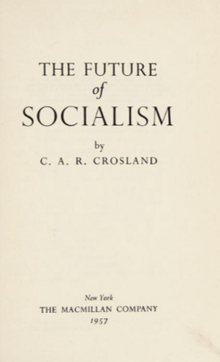 Title page for The Future of Socialism (1957) | |
| Author | Anthony Crosland |
|---|---|
| Language | English |
| Subjects | Socialism, Great Britain |
| Publisher | Jonathan Cape |
Publication date | 1956 |
| Publication place | United Kingdom |
| Media type | Print (hardcover) |
| Pages | 540 pp. (first edition) |
| OCLC | 2162209 |
| LC Class | HX246 .C87 |
The Future of Socialism is a 1956 book by Anthony Crosland. It was one of the most influential books in post-war British Labour Party thinking.[1] It was the seminal work of the 'revisionist' school of Labour politics.[2]
The book defined Labour's perspective on the post-war consensus, by which the major parties largely agreed on issues of the welfare state and economic policy from 1945 to the late 1970s.[3]
Crosland, an Oxford University academic before entering Parliament, had lost his seat in the 1955 general election, and so was able to finish the book he had been working on for several years, seeking to offer a new argument for social democracy in the context of the new political and economic consensus introduced by the 1945–1951 Clement Attlee governments.
However, The Future of Socialism has continued to be a reference point for intellectual debates within the Labour Party and the centre-left in succeeding generations, including the SDP-Labour split in 1981, the modernisation of Labour under Neil Kinnock and the rise of New Labour. The book's 50th anniversary in 2006 sparked a new debate with leading Labour figures including Gordon Brown, Jack Straw,[4] Ed Miliband,[5] Roy Hattersley[6] and others setting out views of its relevance to the next generation of 'post-New Labour' politics. The Fabian Society, which co-published the 2006 edition, set out the argument about 'renewal' of Labour's thinking after a decade in power requires a further generation of 'revisionist' thinking which seeks to emulate Crosland's contribution in the 1950s.
- ^ Jeffreys, Kevin (March 2006). "Tony Crosland, The Future of Socialism and New Labour". History Review. pp. 37–38. Retrieved 17 July 2009.
- ^ Crosland sought to revise the Labour Party's constitutional commitment to the nationalisation of the means of production, distribution and exchange, (Aims, Clause four, party four): "If Socialism is defined as the nationalisation of the means of production, distribution and exchange, we produce solutions which deny almost all the values that socialists have normally read into the word.” Quoted by Hattersley in Hattersley, Roy, To imagine Labour's future, rewind 50 years, The Times online, September 15, 2006, accessed 27 June 2007
- ^ Dutton, David. British Politics Since 1945: The Rise, Fall and Rebirth of Consensus (2nd ed. Blackwell, 1997). excerpt for political history seen from the Post-War Consensus viewpoint.
- ^ Jack Straw, Socialism: the new divide, New Statesman, 18 September 2006, accessed 27 June 2007
- ^ "Why ideology matters, Ed Miliband, Fabian Society". Archived from the original on May 20, 2007. Retrieved 2007-02-16.
{{cite web}}: CS1 maint: bot: original URL status unknown (link), Google cached page accessed 27 June 2007 - ^ Hattersley, Roy, To imagine Labour's future, rewind 50 years, The Times online, September 15, 2006, accessed 27 June 2007
